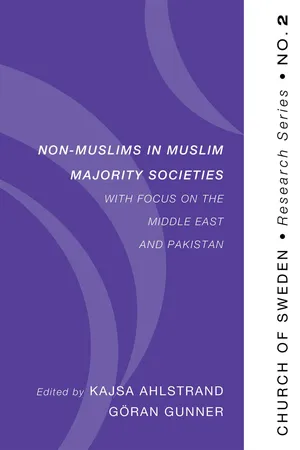
- 174 pages
- English
- ePUB (mobile friendly)
- Available on iOS & Android
About this book
In a world where almost all societies are multi-religious and multi-ethnic, we need to study how social cohesion can be achieved in different contexts. In some geographical areas, as in the Middle East and the Indian subcontinent, people of different religious belonging have, through the ages, lived side by side, sometimes in harmony and sometimes in dissonance. In other geographical regions, as in Scandinavia, societies have been quite religiously homogeneous but only recently challenged by immigration. The implication in both locations is that the relation between religious minority and majority is on the agenda. In order to discuss the situation for Non-Muslims in Muslim majority societies, a consultation was convened with both Muslim and Christian participants from Pakistan, Palestine, Lebanon, and Sweden. Some of the participants work in academic settings, others in faith based organizations, some in jurisprudence and others with theological issues. This book is the result of that consultation; the articles are works in progress, and they remain tentative. The intention with this anthology is to trigger reflection and further thinking. It presents articles that discuss issues such as freedom of religion, minority rights, secular and religious legislation, and inter-religious dialogue in Muslim majority societies.Contributors include: Kajsa Ahlstrand, Goran Gunner, Mustafa Abu Sway, Johan Garde, Yasmin Haider, Jan Hjarpe, M. Aslam Khaki, Bernard Sabella, Mehboob Sada, Guirguis Ibrahim Saleh, and Ahmad SalimThis book is the second volume in Church of Sweden Research Series.
Frequently asked questions
- Essential is ideal for learners and professionals who enjoy exploring a wide range of subjects. Access the Essential Library with 800,000+ trusted titles and best-sellers across business, personal growth, and the humanities. Includes unlimited reading time and Standard Read Aloud voice.
- Complete: Perfect for advanced learners and researchers needing full, unrestricted access. Unlock 1.4M+ books across hundreds of subjects, including academic and specialized titles. The Complete Plan also includes advanced features like Premium Read Aloud and Research Assistant.
Please note we cannot support devices running on iOS 13 and Android 7 or earlier. Learn more about using the app.
Information
The Status of Christians in the Islamic Worldview
Table of contents
- Title Page
- Contributors
- Introduction
- Chapter 1: The Status of Christians in the Islamic Worldview
- Chapter 2: The Problem of Jurisdiction in the Contemporary Nation-State
- Chapter 3: The Use of the Concept Minority
- Chapter 4: Non-Muslim in Middle Eastern Muslim Societies
- Chapter 5: Faith Based Organizations and the Configuration of Civil Society in the MENA-perspective
- Chapter 6: The Status of Non-Muslims in a Palestinian State
- Chapter 7: Managing Christian-Muslim Relations in Pakistani Setting
- Chapter 8: Non-Muslim Women in Pakistan
- Chapter 9: Islamization of Laws in Pakistan and its Effect on Minorities
- Chapter 10: Non-Muslims in an Islamic State
- Chapter 11: Possible Strategies for Religious Communities under Threat1
- Bibliography